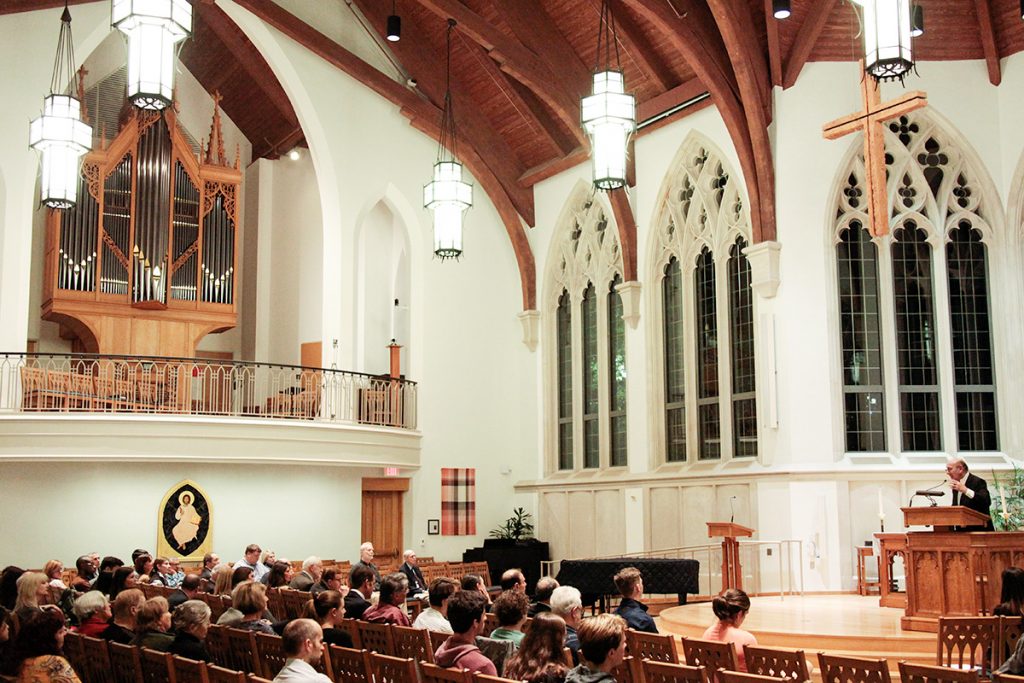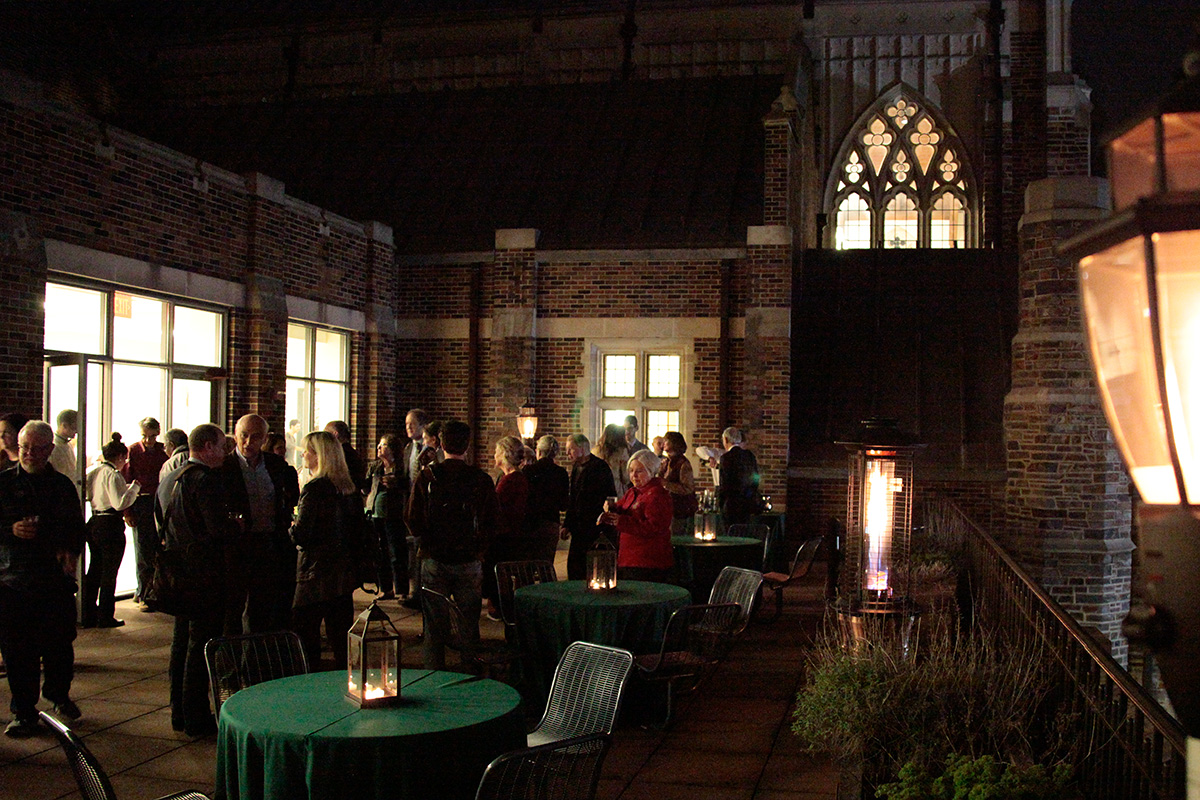What is Life Worth? A discussion with Ken Feinberg

Duke faculty, staff, students, and members of the Durham and surrounding public were treated to an enjoyably insightful talk last week, courtesy of guest lecturer and Special Master of the 9/11 Victims Compensation Fund Kenneth Feinberg. As the 2019/2020 Kenan Distinguished Lecture in Ethics, Feinberg’s talk entitled “What is Life Worth? The Ethical Challenges of Catastrophe Response” embodied the series’ commitment to addressing moral issues of broad social and cultural significance.
 In the beautiful Goodson Chapel of Duke Divinity School, Kenan Director Suzanne Shanahan welcomed the audience on behalf of the Kenan Institute of Ethics saying she could not imagine having a more appropriate or timely discussion. She acknowledged the attendance of Tom Kenan and Dan Drake from the Kenan Fund and thanked them for their ongoing generosity and support of the Institute. Shanahan also gave a special welcome to the DukeEngage Advisory Board, including co-chairs Mark and Benay Todzo. Following a thanks to Kenan/DukeEngage staff for their work in putting together this lecture, Shanahan gave the podium to Kenan Senior Fellow and Duke Law Professor Jonathan Wiener to introduce Feinberg.
In the beautiful Goodson Chapel of Duke Divinity School, Kenan Director Suzanne Shanahan welcomed the audience on behalf of the Kenan Institute of Ethics saying she could not imagine having a more appropriate or timely discussion. She acknowledged the attendance of Tom Kenan and Dan Drake from the Kenan Fund and thanked them for their ongoing generosity and support of the Institute. Shanahan also gave a special welcome to the DukeEngage Advisory Board, including co-chairs Mark and Benay Todzo. Following a thanks to Kenan/DukeEngage staff for their work in putting together this lecture, Shanahan gave the podium to Kenan Senior Fellow and Duke Law Professor Jonathan Wiener to introduce Feinberg.
Wiener described Feinberg’s career arc from graduating law school at NYU, serving as the Special Counsel for the US Senate Committee on the Judiciary, as Chief of Staff for Sen. Edward Kennedy, and then filling a role in society that had not existed – helping to resolve some of the largest, most complex, and most anguished legal cases in American history. Wiener continued to say, “through that work, he’s become a true pioneer in designing compensation systems for cases of unprecedented trauma.” A sampling of those cases include Agent Orange litigation – where Wiener first met Feinberg, the 9/11 Victim Compensation Fund, the Virginia Tech Shooting Fund, the Deepwater Horizon oil spill resolution, the fund for the Boston Marathon bombings, the Newtown-Sandy Hook Community Foundation, the General Motors ignition switch cases, the Volkswagen emissions scandal and most recently the Boeing 737 MAX crashes.
 Feinberg began his remarks saying what a special honor it is not only to be giving this lecture, but also to have Tom Kenan and Dan Drake in the audience, expressing the enormous relevance today of the Kenan Institute for Ethics. “I’m willing to bet there’s never been a more opportune time for policy makers, and academicians, and students, and the public to be focusing today on the ethical implications of public policy.” Outlining his planned narrative, Feinberg stated you could spend an entire seminar discussing the ethical implications of what he does; but for the sake of this talk, he promised to delve into the overriding ethical issues that arise when talking about catastrophes in the United States. Out of his purview, Feinberg further explained, is deciding when a special fund shall be created to compensate victims of catastrophe; rather, our elected officials and even the public determine when a fund should be set-up and administered. As an example, after the Boston Marathon bombings and 9/11 terrorist attack, unsolicited and by the millions, Americans sympathized and empathized with the victims and sent in checks to national and local funds. “One thing I’ve learned among many lessons about these programs,” Feinberg said, “Never ever underestimate the charitable impulse of the American people.” He is always astounded how people come together after national tragedies and respond as one, void of the polarization felt in other areas of American life.
Feinberg began his remarks saying what a special honor it is not only to be giving this lecture, but also to have Tom Kenan and Dan Drake in the audience, expressing the enormous relevance today of the Kenan Institute for Ethics. “I’m willing to bet there’s never been a more opportune time for policy makers, and academicians, and students, and the public to be focusing today on the ethical implications of public policy.” Outlining his planned narrative, Feinberg stated you could spend an entire seminar discussing the ethical implications of what he does; but for the sake of this talk, he promised to delve into the overriding ethical issues that arise when talking about catastrophes in the United States. Out of his purview, Feinberg further explained, is deciding when a special fund shall be created to compensate victims of catastrophe; rather, our elected officials and even the public determine when a fund should be set-up and administered. As an example, after the Boston Marathon bombings and 9/11 terrorist attack, unsolicited and by the millions, Americans sympathized and empathized with the victims and sent in checks to national and local funds. “One thing I’ve learned among many lessons about these programs,” Feinberg said, “Never ever underestimate the charitable impulse of the American people.” He is always astounded how people come together after national tragedies and respond as one, void of the polarization felt in other areas of American life.
 The ethical implications, according to Feinberg, begin with the formation of these special victims compensation funds. As an example, 13 days after 9/11 Congress established by law a fund that would allow claimants to voluntarily and easily be compensated in lieu of individually filing a lawsuit against any party. Feinberg’s role was to determine eligibility of the filed claims and he found that 97% of the families who lost a loved one voluntarily opted into the program, distributing $7.1 billion dollars of taxpayer money. While a proponent of the success of this program in distributing compensation and avoiding litigation, Feinberg asserts that it was a sound piece of public policy, but the right thing to do by only a slim margin. He recounted several letters he received from families of victims in other similar attacks in Oklahoma City and the World Trade Center in 1993 as well as from family members whose loved ones died in acts of heroism. In those cases, there was no fund established, no compensation, and no public policy for those victims. Feinberg warns, “You’d better be careful in creating a special, generous compensation program just for the select few.” Among other examples he cited, “Ethics? I didn’t see any special compensation fund for the thousand people who died after Hurricane Katrina.”
The ethical implications, according to Feinberg, begin with the formation of these special victims compensation funds. As an example, 13 days after 9/11 Congress established by law a fund that would allow claimants to voluntarily and easily be compensated in lieu of individually filing a lawsuit against any party. Feinberg’s role was to determine eligibility of the filed claims and he found that 97% of the families who lost a loved one voluntarily opted into the program, distributing $7.1 billion dollars of taxpayer money. While a proponent of the success of this program in distributing compensation and avoiding litigation, Feinberg asserts that it was a sound piece of public policy, but the right thing to do by only a slim margin. He recounted several letters he received from families of victims in other similar attacks in Oklahoma City and the World Trade Center in 1993 as well as from family members whose loved ones died in acts of heroism. In those cases, there was no fund established, no compensation, and no public policy for those victims. Feinberg warns, “You’d better be careful in creating a special, generous compensation program just for the select few.” Among other examples he cited, “Ethics? I didn’t see any special compensation fund for the thousand people who died after Hurricane Katrina.”
The greatest ethical dilemmas come into play when considering the special circumstances around individual claims, said Feinberg. From his point of view, determining the amount of payout is easy when compared to the challenges of meeting the individual, more administrative needs faced by the victims and their survivors. In the 9/11 fund, the average claim paid for victims who lost their lives was a tax-free check for $2M and $400K to the injured. Throughout the lecture, he told stories that illustrated how no amount of money could erase the pain and make the victims whole again. So, when asked “What was the most difficult part of any of these programs?” Feinberg answers:
The tough part, the debilitating part that you never get over, are the ethical issues that are posed when you’re dealing with the emotions of victims or families of victims. My law degree when it comes to that? A wash! Better a divinity degree, a degree in psychology, because you are dealing one-on-one with individuals who come to see you and pose ethical, practical dilemmas – it is debilitating.
To hear more stories about how Feinberg and his team resolve these ethical issues, we encourage you to watch the talk in its’ entirety here.

The annual Kenan Distinguished Lecture in Ethics is an integral part of the Institute’s ongoing efforts to promote civil dialogue across campus and beyond and would not be possible without the Kenan Family and Kenan Fund for Ethics.
